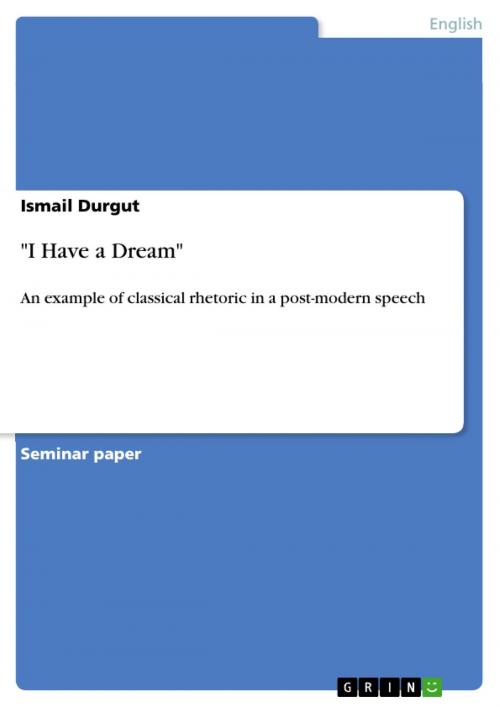'I Have a Dream'
An example of classical rhetoric in a post-modern speech
Fiction & Literature, Literary Theory & Criticism, British| Author: | Ismail Durgut | ISBN: | 9783638055130 |
| Publisher: | GRIN Verlag | Publication: | May 29, 2008 |
| Imprint: | GRIN Verlag | Language: | English |
| Author: | Ismail Durgut |
| ISBN: | 9783638055130 |
| Publisher: | GRIN Verlag |
| Publication: | May 29, 2008 |
| Imprint: | GRIN Verlag |
| Language: | English |
Seminar paper from the year 2008 in the subject English Language and Literature Studies - Literature, grade: 1,7, University of Duisburg-Essen, 7 entries in the bibliography, language: English, abstract: ......Subsequent mass demonstrations culminated in the March on Washington for Jobs and Freedom on August 28, 1963, in which more than 250,000 protesters gathered in Washington, D. C. It was on the steps of the Lincoln Memorial where King delivered his famous 'I Have a Dream' speech. King is known as a charismatic orator. His way of persuading people was to use the power of words instead of physical violence. Words were his weapon and he knew how to use them. The same year after he had delivered this speech, he received the title 'Man of the Year' by Time magazine. One year later, he was given the Nobel Peace Price. This paper deals with 'I Have a Dream', as a post-modern political speech in terms of classical rhetoric. 'Martin Luther King, Jr. (January 15, 1929 - April 4, 1968), was one of the pivotal leaders of the American civil rights movement.' After attending Morehouse College in Atlanta, King went on to study at Crozer Theological Seminary in Pennsylvania and Boston University, where he deepened his understanding of theological scholarship and explored Mahatma Gandhi's nonviolent strategy for social change. On December 5, 1955, after civil rights activist Rosa Parks refused to comply with Montgomery's segregation policy on buses, black residents launched a bus boycott and elected King president of the newly-formed Montgomery Improvement Association. The boycott continued throughout 1956 and King gained national prominence for his role in the campaign. In December 1956, the United States Supreme Court declared Alabama's segregation laws unconstitutional and Montgomery buses were desegregated. Seeking to build upon the success in Montgomery, King and other southern black ministers founded the Southern Christian Leadership Conference (SCLC) in 1957. In the spring of 1963, King and SCLC led mass demonstrations in Birmingham, Alabama, where local white police officials were known for their violent opposition to integration. Clashes between unarmed black demonstrators and police armed with dogs and fire hoses generated newspaper headlines throughout the world. President Kennedy responded to the Birmingham protests by submitting broad civil rights legislation to Congress, which led to the passage of the Civil Rights Act of 1964.
Seminar paper from the year 2008 in the subject English Language and Literature Studies - Literature, grade: 1,7, University of Duisburg-Essen, 7 entries in the bibliography, language: English, abstract: ......Subsequent mass demonstrations culminated in the March on Washington for Jobs and Freedom on August 28, 1963, in which more than 250,000 protesters gathered in Washington, D. C. It was on the steps of the Lincoln Memorial where King delivered his famous 'I Have a Dream' speech. King is known as a charismatic orator. His way of persuading people was to use the power of words instead of physical violence. Words were his weapon and he knew how to use them. The same year after he had delivered this speech, he received the title 'Man of the Year' by Time magazine. One year later, he was given the Nobel Peace Price. This paper deals with 'I Have a Dream', as a post-modern political speech in terms of classical rhetoric. 'Martin Luther King, Jr. (January 15, 1929 - April 4, 1968), was one of the pivotal leaders of the American civil rights movement.' After attending Morehouse College in Atlanta, King went on to study at Crozer Theological Seminary in Pennsylvania and Boston University, where he deepened his understanding of theological scholarship and explored Mahatma Gandhi's nonviolent strategy for social change. On December 5, 1955, after civil rights activist Rosa Parks refused to comply with Montgomery's segregation policy on buses, black residents launched a bus boycott and elected King president of the newly-formed Montgomery Improvement Association. The boycott continued throughout 1956 and King gained national prominence for his role in the campaign. In December 1956, the United States Supreme Court declared Alabama's segregation laws unconstitutional and Montgomery buses were desegregated. Seeking to build upon the success in Montgomery, King and other southern black ministers founded the Southern Christian Leadership Conference (SCLC) in 1957. In the spring of 1963, King and SCLC led mass demonstrations in Birmingham, Alabama, where local white police officials were known for their violent opposition to integration. Clashes between unarmed black demonstrators and police armed with dogs and fire hoses generated newspaper headlines throughout the world. President Kennedy responded to the Birmingham protests by submitting broad civil rights legislation to Congress, which led to the passage of the Civil Rights Act of 1964.















